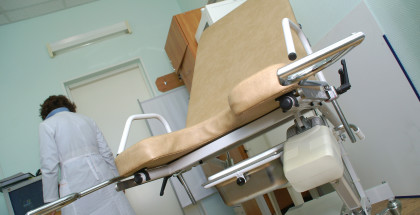This is Why you Need to Visit your Gyno
March 20, 2013 1We had a nagging belief that we, Egyptian women, were not too enlightened when it came to regular visits to our gynecologist, a type of doctor that we all giggle and shy away from, especially those unmarried amongst us. We had this belief simply because out of the four women sitting and discussing the topic, two of them being sexually active, only one had ever been to a gyno before. So we polled over 60 of our readers and here is what we sadly came to know about us all:
65% of women surveyed only visit their gynos when need arises
15% have never visited a gyno
30.6% only visited their gynos when they had an issue that required medical help
22.6% first visited their gynos when they needed contraception
27.4% first visited their gynos when they got married
Check out the detailed results of the survey here.
Gynecologists Dr. Mohamed Abdel Naby and Dr. Hussein Gohar, medical director of the Gohar Hospital, both believe that even though there had been improvement lately, most women only visit their clinics when there is an issue or if they’re getting pregnant. Dr. Gohar operates in upper scale clientele, which means his patients are more aware and health conscious, but he still explains that only a few come for the regular checkups they do and very few single women come at all. Dr. Abdel Naby, however, says most of his clients do not believe in regular checkups at all and pre-marriage check-ups, essential for the wellbeing of spouses and getting the right contraception, are very seldom.
We are disappointed in all of you, and ourselves too since the very writer of this article has only visited a gyno at the age of 27 and after two and a half years of marriage.
We need to talk.
Dr. Gohar warns, “All women need to see their gynecologist regularly regardless of their sexual activity.”
Getting regular checkups in general is necessary, but for some immature reason, we all shy away from visits to the gynecologist because we do not want to sit and discuss with a stranger our sex life, period flow and just how our most private bits are generally doing. So we skip the talk altogether, especially if we assume we might be examined — which wouldn’t happen in your regular visits by the way unless you’re getting tested.
We couldn’t be putting ourselves to more danger if we had meant to, that’s the bitter truth that finally got two of those afore mentioned four women to finally cave in, pay dues to their bodies and visit a gyno. Before we delve into just why it is dangerous not to visit one, let us assure you, the visit wasn’t as bad as expected at all. We are sure though the trip saved us from much more uncomfortable experiences we might have faced if we had chosen to ignore our bodies.
Dr. Abdel Naby explains there are several diseases that remain undiagnosed due to the lack of any symptoms and since the patient doesn’t get regular checkups, she is at risk of facing unnecessary complications.
Here is what you risk when you don’t get regularly examined:
Dr. Gohar explains that benign and malignant tumors as well as hormonal imbalances do not start all of a sudden, but rather develop over time. An early diagnosis of the below problems might mean an easier treatment and preventing unnecessary complications that might lead to serious consequences, including infertility.
- Inflammation in the ovaries
- Inflammation in the ceric
- Breast tumors
- Cervical cancer
- Cysts turning malignant
- Hormonal disturbances
- Sexually transmitted diseases
What you should be doing:
- Go before becoming sexually active: For all you ladies out there, don’t worry, virgins do not submit to full checkups so your first visit to the gyno won’t be as uncomfortable as you think. Dr. Abdel Naby explains you need to visit your gynecologist before becoming sexually active; check up on the ovaries and overall health, and get the right contraceptive and protection for your case. It is also necessary to get the general awareness needed and check for hidden infection that can be sexually transmitted and so need to be treated, says Dr. Gohar.
- Get regular breast examination: Dr. Gohar explains that the frequency of mammograms and examinations depends on the family history and age of the patient. He adds that early onset breast cancer has been on the rise and women should start getting clinical breast examinations at 35 and mammograms at 40, unless there is a family history of cancer, then the tests should start much earlier. This is why you need to consult your doctors at an early age as Dr. Abdel Naby says even women in their 20s are prone to breast cancer now.
- Get regular ovary scans: Although there is no universal screening test for ovarian cancer, “certain blood tests and ultrasound scans can be used to detect early cases when indicated by the personal or family history of a subgroup of women,” says Dr. Gohar.
- If you’re sexually active, get screening tests: Smear tests and other similar procedures help detect abnormal cells that haven’t turned into cancer, “but could on the long run and so they can be treated to prevent the development of invasive cervical cancer,” says Dr. Gohar.
- Regardless of whether you’re sexually active or not, ask your doctor for the vaccine against cervical cancer: Dr. Gohar explains that the Human Papilloma Virus (HPV) that causes cervical cancer can be prevented by a simple vaccine that can be taken as early as the age of 13.
Advised frequency of visits for different ages:
- Women in their teens and early 20s: Only once every two years will suffice.
- Women in their 30s: Once every year as they are more prone to tumors in the ovaries and breasts.
- Women in their 30s and 40s who never gave birth: Dr. Gohar advises them to go for regular check ups as they are more prone to certain uterine benign tumors.
- Of course, if you feel any abnormalities, pains, irregular cycles, heavy bleeding or general discomfort, you need to visit your doctor right away. Dr. Abdel Naby explains that women are often shy to speak about an issue they might have which leads to them waiting until it escalates before they finally have to go to a doctor. This leads to complications that can seriously affect their health and fertility while the issue could easily be solved in earlier stages.
A tip from Dr. Gohar: Tie your gynecologist’s visit with something like your birthday, or any significant date so you can remember it.
Editor’s note:
Choosing the one: Because choosing the right gynecologist is crucial, we polled our readers asking them for recommendations, check out the list of readers-recommended gynecologist here.
Check out the detailed results of the survey here and find out how our readers feel about that awkward gynecologist visit.
Tags
Gynecologist-
It’s good to know that it is suggested that you should regularly receive ovary scans. My daughter would like to attend her first gynecologist visit soon. It may be best for her to get regular exams to make sure that she is okay.

















Comments